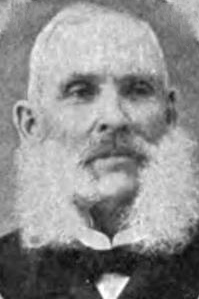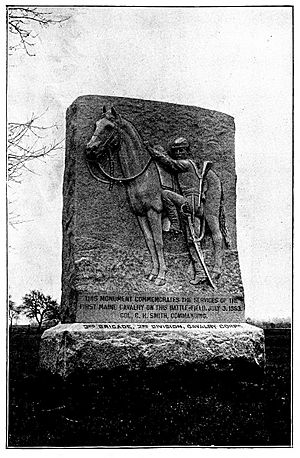Edward Parsons Tobie Jr. facts for kids
Quick facts for kids
Edward Parsons Tobie Jr.
|
|
|---|---|

Edward P. Tobie Jr., c. 1900
|
|
| Born | March 19, 1838 Lewiston, Maine |
| Died | January 21, 1900 (aged 61) Rhode Island |
| Allegiance | |
| Service/ |
|
| Rank | Sergeant-Major |
| Unit | 1st Maine Volunteer Cavalry |
| Battles/wars | American Civil War:
|
| Awards | |
Edward Parsons Tobie Jr. (March 19, 1838 – January 21, 1900) was a United States soldier who received his nation's highest award for bravery during combat, the U.S. Medal of Honor, while fighting with the Union Army during the American Civil War as a sergeant-major with the 1st Maine Volunteer Cavalry. According to his Medal of Honor citation, despite having been severely wounded during the Battle of Sailor's Creek, Virginia on April 6, 1865 and again at Farmville on April 7, he refused hospitalization, choosing instead to remain with his regiment in order to perform the duties of the 1st Maine's regimental adjutant who had recently fallen in combat. Those duties included services rendered by Tobie at Appomattox.
Formative years
Born on March 19, 1838 in Lewiston, Maine, Edward Parsons Tobie Jr. was a son of abolitionist Edward Parsons Tobie, Sr. (1800–1875) and his first wife, Caroline (Frye) Tobie (1804–1838). His father, a wool carder by trade who ultimately became the town clerk of Lewiston, holding that job, with the exception of one year from 1839 until 1875. A deacon with Lewiston's Free Baptist Church, the elder Tobie also helped fugitive slaves escape to Canada. The other siblings in the Tobie household were: Sarah, Mary, Joseph, and Laroy/Leroy (born, respectively, in 1829, 1832, 1838, and 1843).
Civil War
Following his enrollment in Maine for Civil War military service, Edward P. Tobie Jr. officially mustered in for duty as a sergeant with Company G of the 1st Maine Volunteer Cavalry. He then participated with his regiment in a number of the Union Army's most important engagements of the war, including 1862's First Battle of Winchester (May 25) and battles of Cedar Mountain (August 9), Second Bull Run (August 28–30), South Mountain (September 14), Antietam (September 17), and Fredericksburg (December 11–15); 1863's Stoneman's Raid, Battle of Brandy Station (June 9), during which he was taken prisoner after being wounded, and the battles of Gettysburg (July 1–3), and Mine Run (November 7 to December 2); and 1864's battles of Todd's Tavern (May 7), Haw's Shop (May 28), Old Church (May 30), Cold Harbor (May 31 to June 12), Trevilian Station (June 11–12), St. Mary's Church (June 24), Deep Bottom I/Gravel Hill (July 27–29), Ream's Station II (August 25), and Boydton Plank Road (October 27–28).
Tobie was then appointed as sergeant-major on December 12, 1864.
During the spring of 1865, Tobie then performed the act of valor for which he would ultimately be awarded the U.S. Medal of Honor. Despite having been severely wounded in action during the Battle of Sailor's Creek, Virginia on April 6, 1865 and again at Farmville on April 7, he refused hospitalization, choosing instead to remain with his regiment in order to perform the duties of the 1st Maine's regimental adjutant who had recently fallen in combat. Those duties included services rendered by Tobie at Appomattox.
In addition to his Medal of Honor award, Tobie's valor was also recognized via a good conduct mention in the Appomattox battle report filed by his superior officer. On May 8, 1865, Tobie was then commissioned as a second lieutenant with Company E of the 1st Maine Volunteer Cavalry.
With the war over and Reconstruction beginning, he returned home with his regiment in early August 1865.
Post-war life
Following his honorable discharge from the military, Tobie returned home to New England. On September 14, 1870, he and his wife, Adeline (Phipps) Tobie (1843-1891), welcomed the birth of son, Edward (1870–1952). They made their home initially in Providence, Rhode Island, where he was employed as the assistant to the editor of the Providence Journal.
Sometime during the 1870s, Tobie was appointed as the historian of his former Civil War regiment, which had been reconstituted as the First Maine Cavalry Association, and charged with researching and writing that regiment's history. The result was the 1887 publication of History of the First Maine Cavalry 1861-1865.
In 1889, he wrote a poem and history sketch about the 1st Maine Cavalry to celebrate the placement of a monument to his former Civil War regiment on at the Gettysburg National Battlefield. He then read both at that monument's dedication ceremony on October 3, 1889. The words of Tobie's poem heard that day were:
In 1881, he was assigned by the editor of the Providence Journal to oversee that newspaper's Pawtucket, Rhode Island office, a position he continued to hold for nearly two more decades.
Death and interment
Preceded in death by his wife, Addie, in Rhode Island on April 25, 1891, and ailing with Bright's Disease, Edward P. Tobie Jr. died shortly after the turn of the century, in Pawtucket, Rhode Island on January 21, 1900, and was then laid to rest beside his wife at the Swan Point Cemetery in Providence.
See also


